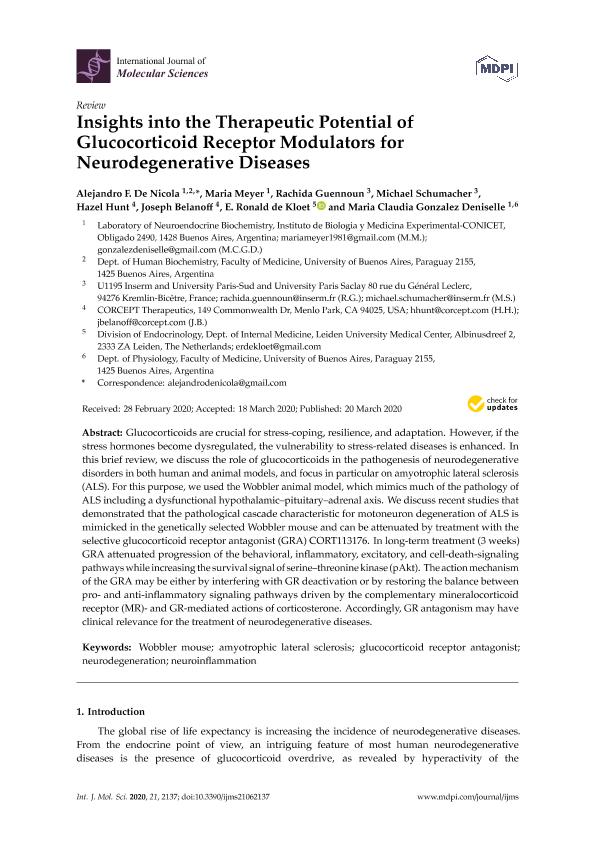Artículo
Insights into the Therapeutic Potential of Glucocorticoid Receptor Modulators for Neurodegenerative Diseases
de Nicola, Alejandro Federico ; Meyer, Maria
; Meyer, Maria ; Guennoun, Rachida; Schumacher, Michael; Hunt, Hazel; Belanoff, Joseph; de Kloet, E. Ronald; Gonzalez Deniselle, Maria Claudia
; Guennoun, Rachida; Schumacher, Michael; Hunt, Hazel; Belanoff, Joseph; de Kloet, E. Ronald; Gonzalez Deniselle, Maria Claudia
 ; Meyer, Maria
; Meyer, Maria ; Guennoun, Rachida; Schumacher, Michael; Hunt, Hazel; Belanoff, Joseph; de Kloet, E. Ronald; Gonzalez Deniselle, Maria Claudia
; Guennoun, Rachida; Schumacher, Michael; Hunt, Hazel; Belanoff, Joseph; de Kloet, E. Ronald; Gonzalez Deniselle, Maria Claudia
Fecha de publicación:
03/2020
Editorial:
Molecular Diversity Preservation International
Revista:
International Journal of Molecular Sciences
ISSN:
1422-0067
Idioma:
Inglés
Tipo de recurso:
Artículo publicado
Clasificación temática:
Resumen
Glucocorticoids are crucial for stress-coping, resilience, and adaptation. However, if the stress hormones become dysregulated, the vulnerability to stress-related diseases is enhanced. In this brief review, we discuss the role of glucocorticoids in the pathogenesis of neurodegenerative disorders in both human and animal models, and focus in particular on amyotrophic lateral sclerosis (ALS). For this purpose, we used the Wobbler animal model, which mimics much of the pathology of ALS including a dysfunctional hypothalamic–pituitary–adrenal axis. We discuss recent studies that demonstrated that the pathological cascade characteristic for motoneuron degeneration of ALS is mimicked in the genetically selected Wobbler mouse and can be attenuated by treatment with the selective glucocorticoid receptor antagonist (GRA) CORT113176. In long-term treatment (3 weeks) GRA attenuated progression of the behavioral, inflammatory, excitatory, and cell-death-signaling pathways while increasing the survival signal of serine–threonine kinase (pAkt). The action mechanism of the GRA may be either by interfering with GR deactivation or by restoring the balance between pro- and anti-inflammatory signaling pathways driven by the complementary mineralocorticoid receptor (MR)- and GR-mediated actions of corticosterone. Accordingly, GR antagonism may have clinical relevance for the treatment of neurodegenerative diseases.
Palabras clave:
ALS
,
GLUCOCORTICOIDS
,
ANTIGLUCOCORTICOID
,
WOBBLER
Archivos asociados
Licencia
Identificadores
Colecciones
Articulos(IBYME)
Articulos de INST.DE BIOLOGIA Y MEDICINA EXPERIMENTAL (I)
Articulos de INST.DE BIOLOGIA Y MEDICINA EXPERIMENTAL (I)
Citación
de Nicola, Alejandro Federico; Meyer, Maria; Guennoun, Rachida; Schumacher, Michael; Hunt, Hazel; et al.; Insights into the Therapeutic Potential of Glucocorticoid Receptor Modulators for Neurodegenerative Diseases; Molecular Diversity Preservation International; International Journal of Molecular Sciences; 21; 3-2020; 1-16
Compartir
Altmétricas



